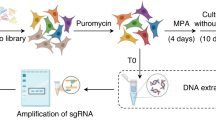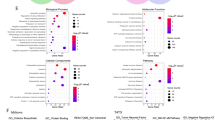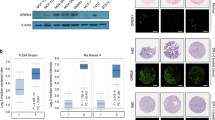Abstract
Progestins have long been used clinically for the treatment of endometrial cancers; however, the response rates to progestin therapy vary and the molecular mechanisms behind progestin insensitivity are poorly understood. We hypothesized that in PTEN-mutated endometrial cancers, hyperactive Akt signaling downregulates progesterone receptor B (PRB) transcriptional activity, leading to overall impaired progestin responses. We report that inhibition of Akt with the Akt inhibitor, MK-2206 (MK), in conjunction with progestin (R5020) treatment, is sufficient to upregulate a subset of PRB target genes in Ishikawa cells stably expressing PRB (PRB-Ishikawa). Through gene ontology analysis of Akt-regulated PRB target genes, angiogenesis was found to be the principle process regulated by Akt-PRB. To further interrogate the mechanism by which Akt modulates PRB transcriptional activity, ChIP-Mass spectrometry was performed to identify potential cofactors that differentially interact with PRB in the presence of R5020 and MK+R5020. 14-3-3σ was identified as a protein enriched in the MK+R5020 data set, and it was demonstrated that 14-3-3σ is required for the upregulation in PRB target gene expression following inhibition of Akt. To determine the ramifications of MK+R5020 treatment on angiogenesis, in vitro assays were performed and combinatorial MK+R5020 treatment significantly decreased endothelial cell invasion and tube formation more than MK or R5020 treatment alone. Furthermore, we found that combinatorial MK-2206+progesterone treatments decreased angiogenesis and proliferation in the Ptend/d conditional mouse model of endometrial cancer. Taken together, these findings suggest that a combinatorial therapeutic approach utilizing Akt inhibitors with progestins may improve the efficacy of progestin therapy for the treatment of endometrial cancer.
This is a preview of subscription content, access via your institution
Access options
Subscribe to this journal
Receive 50 print issues and online access
$259.00 per year
only $5.18 per issue
Buy this article
- Purchase on Springer Link
- Instant access to full article PDF
Prices may be subject to local taxes which are calculated during checkout





Similar content being viewed by others
References
National Cancer Institute. SEER Stat Fact Sheets: Endometrial Cancer, vol. 2015, 2015.
Bansal N, Yendluri V, Wenham RM . The molecular biology of endometrial cancers and the implications for pathogenesis, classification, and targeted therapies. Cancer Control 2009; 16: 8–13.
Erkanli S, Ayhan A . Fertility-sparing therapy in young women with endometrial cancer: 2010 update. Int J Gynecol Cancer 2010; 20: 1170–1187.
Ramirez PT, Frumovitz M, Bodurka DC, Sun CC, Levenback C . Hormonal therapy for the management of grade 1 endometrial adenocarcinoma: a literature review. Gynecol Oncol 2004; 95: 133–138.
Park JY, Nam JH . Progestins in the fertility-sparing treatment and retreatment of patients with primary and recurrent endometrial cancer. Oncologist 2015; 20: 270–278.
Ushijima K, Yahata H, Yoshikawa H, Konishi I, Yasugi T, Saito T et al. Multicenter phase II study of fertility-sparing treatment with medroxyprogesterone acetate for endometrial carcinoma and atypical hyperplasia in young women. J Clin Oncol 2007; 25: 2798–2803.
Thigpen JT, Brady MF, Alvarez RD, Adelson MD, Homesley HD, Manetta et al. Oral medroxyprogesterone acetate in the treatment of advanced or recurrent endometrial carcinoma: a dose-response study by the Gynecologic Oncology Group. J Clin Oncol 1999; 17: 1736–1744.
Yang S, Thiel KW, Leslie KK . Progesterone: the ultimate endometrial tumor suppressor. Trends Endocrinol Metab 2011; 22: 145–152.
Dai D, Kumar NS, Wolf DM, Leslie KK . Molecular tools to reestablish progestin control of endometrial cancer cell proliferation. Am J Obstet Gynecol 2001; 184: 790–797.
Dai D, Wolf DM, Litman ES, White MJ, Leslie KK . Progesterone inhibits human endometrial cancer cell growth and invasiveness: down-regulation of cellular adhesion molecules through progesterone B receptors. Cancer Res 2002; 62: 881–886.
Smid-Koopman E, Blok LJ, Kuhne LC, Burger CW, Helmerhorst TJ, Brinkmann AO et al. Distinct functional differences of human progesterone receptors A and B on gene expression and growth regulation in two endometrial carcinoma cell lines. J Soc Gynecol Invest 2003; 10: 49–57.
Cancer Genome Atlas Research Network, Kandoth C, Schultz N, Cherniack AD, Akbani R, Liu Y et al. Integrated genomic characterization of endometrial carcinoma. Nature 2013; 497: 67–73.
Gu C, Zhang Z, Yu Y, Liu Y, Zhao F, Yin L et al. Inhibiting the PI3K/Akt pathway reversed progestin resistance in endometrial cancer. Cancer Sci 2011; 102: 557–564.
Pant A, Lee II, Lu Z, Rueda BR, Schink J, Kim JJ . Inhibition of AKT with the orally active allosteric AKT inhibitor, MK-2206, sensitizes endometrial cancer cells to progestin. PLoS One 2012; 7: e41593.
Clarke CL, Graham JD . Non-overlapping progesterone receptor cistromes contribute to cell-specific transcriptional outcomes. PLoS One 2012; 7: e35859.
Mohammed H, D'Santos C, Serandour AA, Ali HR, Brown GD, Atkins et al. Endogenous purification reveals GREB1 as a key estrogen receptor regulatory factor. Cell Rep 2013; 3: 342–349.
Bergers G, Benjamin LE . Tumorigenesis and the angiogenic switch. Nat Rev Cancer 2003; 3: 401–410.
Daikoku T, Hirota Y, Tranguch S, Joshi AR, DeMayo FJ, Lydon JP et al. Conditional loss of uterine Pten unfailingly and rapidly induces endometrial cancer in mice. Cancer Res 2008; 68: 5619–5627.
Rubel CA, Lanz RB, Kommagani R, Franco HL, Lydon JP, DeMayo FJ . Research resource: genome-wide profiling of progesterone receptor binding in the mouse uterus. Mol Endocrinol 2012; 26: 1428–1442.
Takano M, Lu Z, Goto T, Fusi L, Higham J, Francis J et al. Transcriptional cross talk between the forkhead transcription factor forkhead box O1A and the progesterone receptor coordinates cell cycle regulation and differentiation in human endometrial stromal cells. Mol Endocrinol 2007; 21: 2334–2349.
Vasquez YM, Mazur EC, Li X, Kommagani R, Jiang L, Chen R et al. FOXO1 is required for binding of PR on IRF4, novel transcriptional regulator of endometrial stromal decidualization. Mol Endocrinol 2015; 29: 421–433.
Goto T, Takano M, Albergaria A, Briese J, Pomeranz KM, Cloke B et al. Mechanism and functional consequences of loss of FOXO1 expression in endometrioid endometrial cancer cells. Oncogene 2008; 27: 9–19.
Aitken A . 14-3-3 proteins: a historic overview. Semin Cancer Biol 2006; 16: 162–172.
Quayle SN, Sadar MD . 14-3-3 sigma increases the transcriptional activity of the androgen receptor in the absence of androgens. Cancer Lett 2007; 254: 137–145.
Titus MA, Tan JA, Gregory CW, Ford OH, Subramanian RR, Fu H et al. 14-3-3{eta} amplifies androgen receptor actions in prostate cancer. Clin Cancer Res 2009; 15: 7571–7581.
Wakui H, Wright AP, Gustafsson J, Zilliacus J . Interaction of the ligand-activated glucocorticoid receptor with the 14-3-3 eta protein. J Biol Chem 1997; 272: 8153–8156.
Zilliacus J, Holter E, Wakui H, Tazawa H, Treuter E, Gustafsson JA . Regulation of glucocorticoid receptor activity by 14—3-3-dependent intracellular relocalization of the corepressor RIP140. Mol Endocrinol 2001; 15: 501–511.
De Vries-van Leeuwen IJ, da Costa Pereira D, Flach KD, Piersma SR, Haase C, Bier D et al. Interaction of 14-3-3 proteins with the estrogen receptor alpha F domain provides a drug target interface. Proc Natl Acad Sci USA 2013; 110: 8894–8899.
Lodygin D, Diebold J, Hermeking H . Prostate cancer is characterized by epigenetic silencing of 14-3-3sigma expression. Oncogene 2004; 23: 9034–9041.
Nakayama H, Sano T, Motegi A, Oyama T, Nakajima T . Increasing 14-3-3 sigma expression with declining estrogen receptor alpha and estrogen-responsive finger protein expression defines malignant progression of endometrial carcinoma. Pathol Int 2005; 55: 707–715.
Mhawech P, Benz A, Cerato C, Greloz V, Assaly M, Desmond JC et al. Downregulation of 14-3-3sigma in ovary, prostate and endometrial carcinomas is associated with CpG island methylation. Mod Pathol 2005; 18: 340–348.
Winter S, Simboeck E, Fischle W, Zupkovitz G, Dohnal I, Mechtler K et al. 14-3-3 proteins recognize a histone code at histone H3 and are required for transcriptional activation. EMBO J 2008; 27: 88–99.
Razandi M, Pedram A, Levin ER . Estrogen signals to the preservation of endothelial cell form and function. J Biol Chem 2000; 275: 38540–38546.
Gibson DA, Greaves E, Critchley HO, Saunders PT . Estrogen-dependent regulation of human uterine natural killer cells promotes vascular remodelling via secretion of CCL2. Hum Reprod 2015; 30: 1290–1301.
Shifren JL, Tseng JF, Zaloudek CJ, Ryan IP, Meng YG, Ferrara N et al. Ovarian steroid regulation of vascular endothelial growth factor in the human endometrium: implications for angiogenesis during the menstrual cycle and in the pathogenesis of endometriosis. J Clin Endocrinol Metab 1996; 81: 3112–3118.
Hsu SP, Ho PY, Juan SH, Liang YC, Lee WS . Progesterone inhibits human endothelial cell proliferation through a p53-dependent pathway. Cell Mol Life Sci 2008; 65: 3839–3850.
Lebovic DI, Shifren JL, Ryan IP, Mueller MD, Korn AP, Darney PD et al. Ovarian steroid and cytokine modulation of human endometrial angiogenesis. Hum Reprod 2000; 15: 67–77.
Okada H, Okamoto R, Tsuzuki T, Tsuji S, Yasuda K, Kanzaki H . Progestins inhibit estradiol-induced vascular endothelial growth factor and stromal cell-derived factor 1 in human endometrial stromal cells. Fertil Steril 2011; 96: 786–791.
Goddard LM, Murphy TJ, Org T, Enciso JM, Hashimoto-Partyka MK, Warren CM et al. Progesterone receptor in the vascular endothelium triggers physiological uterine permeability preimplantation. Cell 2014; 156: 549–562.
Livak KJ, Schmittgen TD . Analysis of relative gene expression data using real-time quantitative PCR and the 2(-Delta Delta C(T)) Method. Methods 2001; 25: 402–408.
Sefton EC, Qiang W, Serna V, Kurita T, Wei JJ, Chakravarti D et al. MK-2206, an AKT inhibitor, promotes caspase-independent cell death and inhibits leiomyoma growth. Endocrinology 2013; 154: 4046–4057.
Acknowledgements
We would like to acknowledge the Northwestern Genomics Core Facility, the Northwestern Proteomics Core Facility, and the Northwestern Next Generation Sequencing Core Facility. We would also like to thank members of the Kim laboratory for technical assistance and insightful discussion and review of the manuscript. This work is supported by NIH/NCI training grant T32CA09560 (IIL), Malkin Scholars Program from the Robert H. Lurie Comprehensive Cancer Center of Northwestern University (IIL), NIH/NICHD grant R01HD042311 (JPL) and NIH/NCI grant R01CA155513 (JJK).
Author information
Authors and Affiliations
Corresponding author
Ethics declarations
Competing interests
The authors declare no conflict of interest.
Additional information
Supplementary Information accompanies this paper on the Oncogene website
Supplementary information
Rights and permissions
About this article
Cite this article
Lee, I., Maniar, K., Lydon, J. et al. Akt regulates progesterone receptor B-dependent transcription and angiogenesis in endometrial cancer cells. Oncogene 35, 5191–5201 (2016). https://doi.org/10.1038/onc.2016.56
Received:
Revised:
Accepted:
Published:
Issue Date:
DOI: https://doi.org/10.1038/onc.2016.56
This article is cited by
-
Effect of a protein kinase B (Akt) inhibitor on the angiogenesis of HUVECs and corneal neovascularization
Wiener klinische Wochenschrift (2024)
-
Brusatol sensitizes endometrial hyperplasia and cancer to progestin by suppressing NRF2-TET1-AKR1C1-mediated progestin metabolism
Laboratory Investigation (2022)
-
Genistein induces long-term expression of progesterone receptor regardless of estrogen receptor status and improves the prognosis of endometrial cancer patients
Scientific Reports (2022)
-
Knockdown of long non-coding HOTAIR enhances the sensitivity to progesterone in endometrial cancer by epigenetic regulation of progesterone receptor isoform B
Cancer Chemotherapy and Pharmacology (2019)
-
MIG-6 suppresses endometrial epithelial cell proliferation by inhibiting phospho-AKT
BMC Cancer (2018)



